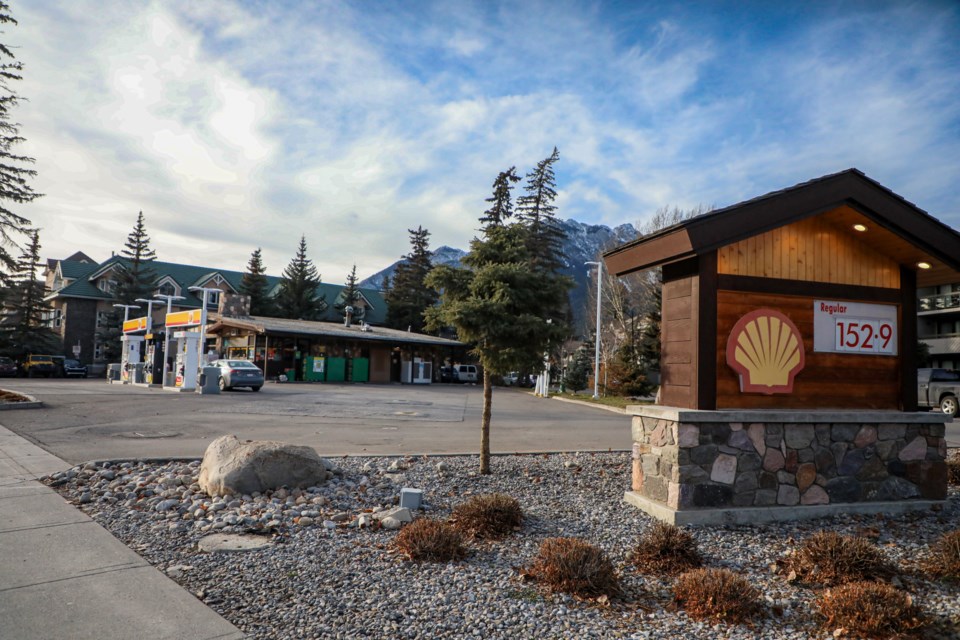BANFF – Shell Canada wants to redevelop its aging Banff Avenue gas station to include a much larger space for convenience retail and eating and drinking options by getting rid of the auto repair garage – one of four in town.
A proposed land bylaw amendment, which seeks to increase the percentage of gross floor area in service stations for convenience retail stores and eating and drinking establishments to 70 per cent, was before Municipal Planning Commission (MPC) for feedback Wednesday (Nov. 8).
Shell officials say a higher percentage of convenience retail space is more in line with the current industry standard, adding that meeting the current target of 10 per cent set in the bylaw, would “render this redevelopment unfeasible.”
Devin Mahaffey, president of CTM Design Services working for Shell, said much has changed in the service station landscape over the past 30 years.
“We do not do any design work for any of our clients that are inclusive of service bays anymore,” he said, noting that is across the board and not just specific to Shell.
Banff currently has four automotive repair businesses, including three in the industrial compound. Of the four, the only one within a service station is the Shell on the 400 block of Banff Avenue.
Prior to 2001, retail and restaurant uses located in service stations were not restricted in terms of gross floor area within the commercial accommodation (CA) district where the Shell gas station is located.
“The limit was introduced to address an identified community need and concerns about the loss of vehicle repair bays within service stations,” said Kathleen Gallagher, development planner for the Town of Banff.
In 2016, a similar land use bylaw amendment application was before council, which was approved with one qualifier – the 70 per cent for retail and eating and drinking only applied to redevelopment of the Husky while the uses were limited to 10 per cent for the rest of the district.
If considering maintaining the existing rules around convenience retail and eating and drinking establishment in order to protect essential services like auto repair garages for residents, Gallagher said MPC may wish to consider if other land use directs are appropriate for such services.
Gallagher said the industrial compound allows for car and equipment repair shops and gas stations as permitted uses. Eating and drinking establishments are discretionary uses, though convenience retail is not allowed.
“There has been the development of automotive and equipment repair shops in the commercial services land use district, which offers vehicle repair,” she said.
Kerry Morrison, who is in network engineering as part of Shell Canada, said the site at 435 Banff Ave. is aging, no longer efficient, lacks some of Shell’s new services and the underground tanks for fuel need replacing.
She said other sites across Shell’s portfolio include fast-food restaurants and food services like M&M Meats of Freshii pick-up stands.
“We are really interested to hear feedback about this bylaw amendment and allow us to explore what options we have,” she said, noting the average size of Shell convenience stores is 211 square metres.
MPC commissioner Barb Pelham wanted to know the number of vehicles annually coming into Banff – home to about 8,300 residents and drawing four million tourists a year – and how the number of car repair garages in municipalities with similar vehicle volumes compare to Banff.
“Basically, I am wondering can our community lose a garage?” she said.
Dave Michaels, manager of planning services for the Town of Banff, said between 25,000 and 35,000 vehicles a day enter Banff in peak summer, though he said there has been no analysis done on Pelham’s other question.
“Ultimately, council has always decided to let the market determine what is suitable for our community,” he said.
Michaels said any redevelopment of the Shell service station is subject to federally legislated commercial growth regulations.
“When and if the property owner decides to redevelop, then obviously the commercial floor area on site can’t grow,” he said.
MPC decided to forward the proposed land use bylaw amendment to council, but recommended council consider the implications of intensification of uses would have on housing and parking within the community.
The commission also recommended council review the intent of the commercial accommodation and industrial compound district’s purpose statements, and review the definitions of service stations and automotive and equipment repair shops for clarity between the two uses.
Lastly, commissioners wanted to see increased public notification above legislated requirements for the proposed amendment.
Stavros Karlos, chair of MPC, said he believes the commission’s recommendations capture the concerns with any rezoning application.
“Banff is a community within a legislated commercial growth cap and we have come to the end of that road and, therefore, we are now discussing intensification of all of the scraps of commercial square footage left in town,” he said.
“Each of those changes now has a ripple effect on the community and I believe the motions put forward by MPC give consideration to all of those impacts.”




